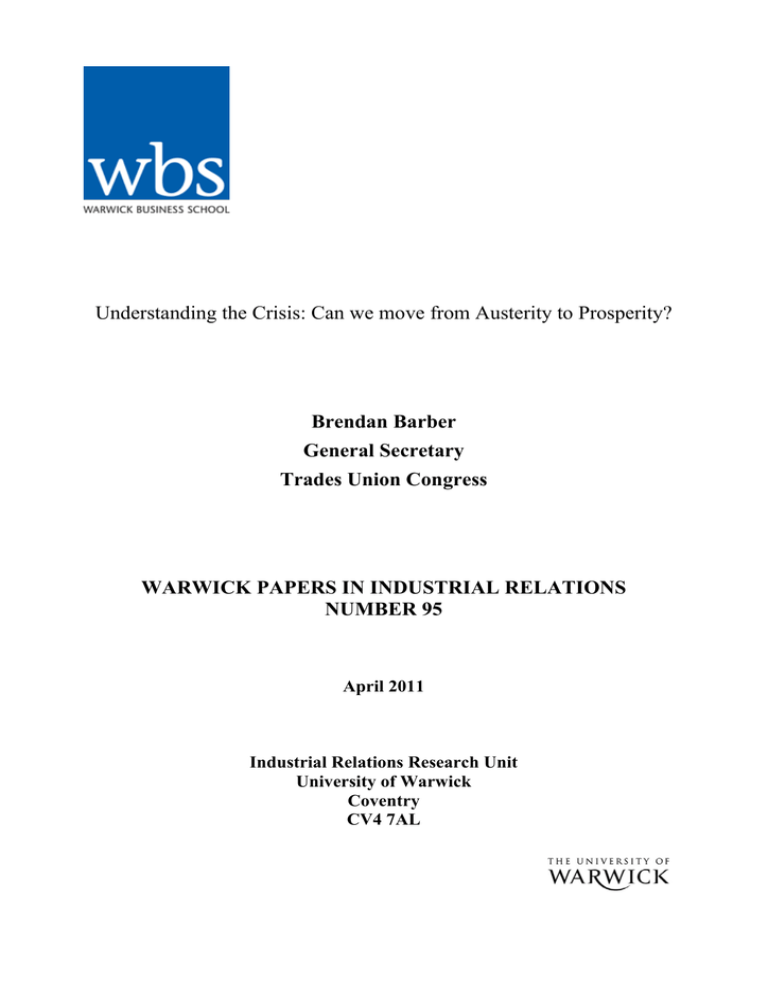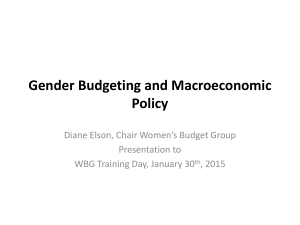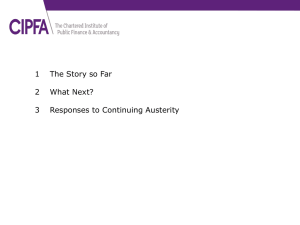Brendan Barber General Secretary Trades Union Congress
advertisement

Understanding the Crisis: Can we move from Austerity to Prosperity? Brendan Barber General Secretary Trades Union Congress WARWICK PAPERS IN INDUSTRIAL RELATIONS NUMBER 95 April 2011 Industrial Relations Research Unit University of Warwick Coventry CV4 7AL Editors’ Foreword The Warwick Papers in Industrial Relations series publishes the work of members of the Industrial Relations Research Unit (IRRU) and people associated with it. Papers may be of topical interest or require presentation outside of the normal conventions of a journal article. A formal editorial process ensures that standards of quality and objectivity are maintained. This paper publishes the text of the tenth Warwick-Acas Lowry Lecture, given to an invited audience at the headquarters of the Engineering Employers Federation (EEF) on 22nd March 2011 by Brendan Barber, General Secretary of the Trades Union Congress (TUC). The annual lecture is organised in honour of Sir Pat Lowry. A former chair of the Advisory Conciliation and Arbitration Service (Acas), Sir Pat was for many years an Honorary Professor at the University of Warwick, a long-standing member of the Business School’s Advisory Board, and a source of valued counsel to IRRU in its work. His outstanding contribution to the practice of industrial relations commenced when he joined the EEF in 1938. He went on to become the Federation’s Director of Industrial Relations. He left in 1970 to join British Leyland as Director of Industrial Relations. In 1981, Sir Pat was appointed as Chair of Acas. He stepped down six years later with Acas’ reputation for impartial and constructive advice enhanced, in the face of an often turbulent industrial relations landscape. In this year’s lecture, Brendan Barber addressed the nature and extent of the current crisis facing Britain’s workplaces and workforce. He identified a series of myths underpinning current government policy towards tackling the deficit in public finances and argued that they risk exacerbating economic decline. An alternative approach was outlined, including immediate and more fundamental adjustments in the balance of the economy. These require bold and strategic roles for the state in ensuring effective investment and regulation. The lecture can be read in conjunction with last year’s address by Richard Lambert (Warwick Paper Number 93, April 2010), at that time Director-General of the Confederation of British Industry. Together they provide authoritative, sometimes contending, contributions to current debate in employment relations at a time of daunting challenges and advance the influential role of the Warwick-Acas Lowry Lecture. Trevor Colling and Paul Marginson 1 Understanding the Crisis: Can we Move from Austerity to Prosperity? Thank you to colleagues at Acas and the Industrial Relations Research Unit at Warwick University for inviting me to speak. The TUC has very close relations with both organisations, who contribute a great deal to our work, and it is a pleasure to be here this evening. It is a great honour to give the tenth annual lecture in memory of Sir Pat Lowry, who built his career here at the EEF. Pat first came to my attention when I began my career at the TUC in the mid 1970s, when he was director of industrial relations at British Leyland – arguably the most difficult position in employment relations at the time. Or indeed at any other time. For those of you who do not remember those days, Pat’s job involved acting as a peacemaker between Leyland boss Sir Michael Edwardes, who believed in “management’s right to manage”, and legendary shop steward Derek Robinson – who believed in the exact opposite. And it was not always pretty. In 1981, Pat wisely decided to step out of the frying pan. Unfortunately, he then stepped into the fire. As chair of Acas, he worked to resolve some of the most intractable industrial disputes of the post-war period. As many of you will remember, those were hugely difficult times for both sides of British industry. I got to know Pat personally in those years, and remember him with great affection. His integrity, impartiality and decency commanded the respect of all – and his contribution to the theory and practice of industrial relations was immense. That is what we remember tonight. The 1970s and early 1980s were of course turbulent times economically and industrially. Instability in the Middle East had produced an oil price shock. Inflation was a persistent problem. The economy scraped along the bottom. And workers became restless as living standards plummeted; themes that are becoming familiar once again. By the end of the 1970s, the post-war Keynesian settlement had collapsed. And what followed was three decades of neoliberalism – deregulation, privatisation and labour market liberalisation. Where the state had once been all powerful, the market now reigned supreme. Union power was systematically weakened. Collective bargaining declined. Managers now had their right to manage. But the biggest change was the financialisation of the global economy – and nowhere personified this seismic shift more than Britain. As the Thatcher government allowed heavy 2 industries to decline, the City thrived. Technological change, the Big Bang and a favourable time zone all helped London to become the preeminent global financial centre. Firms from all over the world came to do business in the Square Mile. Trading increased exponentially. Markets and products became ever more sophisticated – and ever more risky. And the rewards for those at the top – the star investment bankers, hedge fund managers and private equity moguls – became unimaginable, just as they did for captains of industry. But for most workers, wages stagnated – and as they did so, consumer demand was fuelled by rising debt. An unprecedented credit boom took hold in the West, increasingly financed by new economic actors in the Middle East and Asia. As the years went by, this economic model began to creak under the weight of its own contradictions. It finally came crashing down on 15 September 2008, the day Lehman Brothers filed for bankruptcy and the defining moment of the worst financial crash since 1929. And we have all been living with the consequences since: a trillion pound bailout of the banks in the UK alone; the deepest recession since the 1930s; and the biggest peacetime black hole in the public finances. Today, some two and a half years on from the crash, we stand at a historically important crossroads. And tonight I want to talk about what comes next. About how we get to grips with the crisis we continue to face. How we move from austerity to prosperity. And how we move on from the wreckage of neoliberalism and build a new economic model that delivers for all. And the argument I want to make has two simple dimensions. First, I want to show that the best way to tackle our deficit is not through spending cuts of unprecedented speed and scale, but through policies that promote growth and jobs. That is the immediate challenge we face over the next five to ten years. And second, I want to set out how we rebalance and reconfigure our economy for the long term. And I want to focus not just on the need to reform the financial system and rebuild manufacturing, but on the need to nurture a more equal relationship between capital and labour and deliver higher wages for ordinary workers. That is the fundamental challenge we face in the decades ahead. But before I describe this journey, I want to say a few words about the scale of the crisis facing us in Britain today. 3 The Scale of the Crisis With the Budget taking place tomorrow and the TUC’s March for the Alternative taking place on Saturday 26th March – which we believe will be the biggest trade union mobilisation in a generation – this is certainly an opportune moment to look at just what we are up against. The crisis we face has many facets. Most visibly, the government’s decision to cut £81 billion from public spending over the next four years will have a devastating impact on the services that millions of people rely on – among them frontline services such as the NHS, schools and the police. As the Institute for Fiscal Studies has argued, many of these cuts are clearly regressive. Indeed TUC research has shown that those least able to cope will pay the heaviest price – with the poorest 10 per cent of the population hit 15 times harder by the cuts than the top 10 per cent. But the cuts also risk undermining the economy. Even before austerity really takes effect, the signs are alarming – with the economy contracting by 0.6 per cent in the final quarter of last year. With unemployment rising, and the Chartered Institute of Personnel and Development forecasting that 1.6 million people will join the dole queues as a result of the cuts, the outlook is bleak. Assuming we avoid a double dip recession, an anaemic, jobless recovery looks like the best we can hope for. The uncertain economic consequences of the triple disasters in Japan and the unresolved political turmoil in the Middle East also add to the sense of foreboding. Now the government seems to think that as it drastically cuts the public sector, the private sector will automatically step in and fill the void. But with large swathes of UK plc dependent on the £200 billion-plus the state spends procuring its goods and services this appears to be wishful thinking. Ministers believe the private sector will create 2.5 million new jobs during the course of this parliament – but TUC research suggests it will take the private sector 14 years to create enough jobs to get employment back to pre-recession levels. With the latest figures showing unemployment at the highest level since the mid-1990s, and youth unemployment at record levels, the chances of private sector resurgence look pretty slim. For workers, spending cuts, a weak economy and rising joblessness add up to an unpleasant cocktail. In January Mervyn King noted that the combination of cuts, tax and benefit changes 4 and rising inflation added up to the biggest attack on workers’ living standards in almost a century. Tellingly, real wages this year are expected to be no higher than in 2005. What all of this means for industrial relations remains unclear. During the recession, workers and unions took a grimly pragmatic view, sometimes negotiating pay freezes, short-time working and temporary plant closures in order to save jobs: what some commentators have dubbed concession bargaining. As firms now return to profitability, as balance sheets are rebuilt, and as the cost of living increases, unions in the private sector will certainly be looking to win a better deal for their members – albeit with a careful eye on the wider economic picture. But in the public sector it could be much more volatile. With the government cutting hundreds of thousands of jobs, freezing the pay of many workers, and looking to trim the pension rights of six million public servants, feelings are understandably running high. While talk of general strikes or generalised strikes is well wide of the mark, I do not rule out the prospect of co-ordinated industrial action, notably on pensions. Public servants do not want to pick up the tab for a crisis caused by the banks – and justifiably so. So be in no doubt: whether it is jobs, living standards, the state of the economy, or the public finances, we are in a very deep hole. And the government has bet everything on a colossal gamble: its plan to wipe out our structural deficit in a single parliament. Nothing like this has ever been done before. Smaller economies such as Canada and Sweden conducted similar experiments in the 1990s – but in the context of a booming global economy. We really are entering uncharted territory. The Immediate Challenge: Exposing the Myths, Establishing the Alternative So let me now turn to my first main theme: why the government is wrong to make such savage cuts – and what an alternative approach might look like. And I want to make one thing clear at the outset – the TUC are not deficit deniers. We know that borrowing one pound in every four we spend is unsustainable, and we agree that spending more on servicing debt interest than on educating our children is just plain wrong. What we need is a Plan B. When it comes to getting the deficit down, what matters is what works in the long term. My concern is that the government’s answer – to slash public spending with reckless speed – is based not on a sound reading of the evidence, but on an ideological zeal to shrink the size of the state. The so-called reforms in the NHS and education threaten the fundamental character of our public realm. 5 Four myths about the deficit This brutal austerity is being implemented on the back of a series of myths – half truths and distortions that have poisoned our public debate. I make no apologies for addressing each of these myths in detail. Myth one: the deficit was caused by out of control public spending. Not true. Now I accept that after 2001, Labour began running larger deficits – though these fell during 2006 and 2007. Indeed when the credit crunch began in 2007, overall UK debt as a proportion of GDP was 37 per cent, the lowest of any G7 country. Nor was there a significant structural deficit in the public finances until the collapse of City tax revenues in 2008. So the huge deficit we now face was not caused by spending on schools or hospitals, as the government would have us believe, but by the costs of managing the financial crisis: the bank bailout that prevented meltdown in the City; the fiscal stimulus that stopped recession from becoming depression; and the decline in tax revenues and increase in social costs that have resulted from the downturn. In effect what has happened over the past few years is a crisis in the private sector has become a crisis of the public sector – with vast debts transferred from the banks to the taxpayer. Myth two: without drastic cuts, Britain would become the next Greece. This is a familiar ministerial refrain, often heard just after the coalition came to power, and it is completely wrong. Britain can finance its debt at affordable rates: 10-year bond yields are around 3.5 per cent, compared to over 12 per cent in Greece. With two-thirds of our sovereign debt underwritten by UK investors and an average maturation period of 14 years, refinancing is far less of a problem than even for the likes of France or Germany. Overall, we spend just over 3 per cent of our annual GDP servicing our debt – compared to 12 per cent in Greece. To quote the distinguished FT columnist Sir Sam Brittan: “Don’t talk to me about Greece or Ireland. We can disregard the bogey of the government not being able to sell its securities at an acceptable price”. Myth three: Britain is like a household that has “maxed out” on its credit card. It is a great soundbite, and one that the public can easily relate to, but again, it has one simple flaw: it is just not accurate. Unlike households, sovereign nations can print money, raise taxes and fund debt over many decades. Had they been in power in 1945, coalition ministers would have doubtless used their credit card analogy – yet within a decade we had got the economy back on track, built the NHS, extended the welfare state, and constructed millions of council homes. And through growth and full employment, Britain also got its deficit down. 6 Myth four: there is no alternative. Once again, that is playing hard and fast with the truth, because there is a different way forward: a more sustainable, more gradual, more robust deficit reduction plan based on jobs, growth and tax justice. And in four days’ time the TUC will be taking this message to the people of Britain as we stage our national demonstration against the cuts: what we have dubbed the “March for the Alternative”. Establishing the alternative So what does our alternative look like? Well, I have mentioned the need to make jobs and growth the priority – keeping people in work, keeping tax revenues flowing, limiting the huge social costs of unemployment. And rather than swingeing cuts, we need a much more prominent role for progressive taxes – not least on the City and the bankers who caused this mess. The TUC believes this is the fairest and most sustainable way of tackling the deficit. So far, so good, you might say: but where’s the evidence to support this argument? Well, the case for jobs and growth is overwhelming. The lesson of economic history is clear: this is the best way of getting the public finances under control in the long run. Massive cuts are a false economy. As we saw in the 1930s, austerity begets more austerity – more unemployment, more misery for working people, and yes, more national debt. Just think about what’s been happening in Ireland, which has made eye-watering cuts to satisfy the markets and latterly the IMF. It remains locked in an economic death spiral, with figures released last week showing unemployment has reached almost 15 per cent – and its deficit is getting worse not better. Contrast this with the experience of the United States, which has kept the spending taps on, and where jobs, growth, tax revenues and consumer confidence are now returning. Perhaps it is no surprise that a vast body of economic opinion is against savage cuts in public spending and in favour of pro-growth policies. Not just the usual suspects like former MPC member Danny Blanchflower and Keynes biographer Lord Skidelsky, but pro-market commentators such as Martin Wolf and Sam Brittan at the FT, and even Boris Johnson – who has questioned how far we can cut the deficit without provoking a double dip recession. Perhaps most tellingly, three of the most recent Nobel prize-winning economists have also laid into government’s approach. Christopher Pissarides has remarked that: “Overall the Chancellor is putting the economy through some unnecessary risks because of his fear of sovereign risk, which does not appear justified”. 7 Or think about this from Joseph Stiglitz: “Britain is embarking on a highly risky experiment. More likely than not, it will add one more data point to the well established result that austerity in the midst of a downturn lowers GDP and increases unemployment, and excessive austerity can have long-lasting effects”. Finally, Paul Krugman has likened the Chancellor’s approach as, “coming from the desk of Andrew Mellon, the Treasury Secretary who told President Herbert Hoover to fight the Depression by liquidating the farmers, liquidating the workers and driving down wages”. As Krugman says, “people who think that fiscal expansion now is bad for future generations have got it exactly wrong. The best course of action, both for today’s workers and their children, is to do whatever it takes to get this economy on the road to recovery.” And just as the case for pro-growth policies is compelling, so too are the arguments for fair tax. The coalition government has made the decision to make £4 of spending cuts for every £1 of tax rises – the bulk of which is coming from higher VAT, the most regressive tax of all. The TUC believes this balance needs to change, with the tax burden falling on those most responsible for the crisis we now face. That is why we are calling for a determined clamp down on the £25 billion of tax avoidance committed by the City, UK plc and the super rich; why we want to see a much bolder banking levy and more robust taxes on bankers’ bonuses; and why we want to see a Robin Hood Tax on financial transactions, which would raise tens of billions if implemented unilaterally in the UK and much more if introduced either at EU or global level. Encouragingly, the European Parliament voted in favour of such a tax earlier this month. So there is a genuine alternative, with fair tax, growth and jobs at its heart. And these arguments are increasingly resonating with the public. After the election, a majority of voters said they were in favour of spending cuts, at least in principle. Now, a majority are against cuts of the speed and scale being proposed by the government. And with bankers paying themselves £7 billion in bonuses this spring, there is a growing public clamour for change – as I think we will see in London this Saturday. The Fundamental Challenge – Rebalancing the Economy But as the TUC sets out our alternative to austerity – likely to be the battleground of British politics for the course of this parliament – we are also thinking about the longer term. If the immediate challenge we face is getting ourselves through the current crisis and getting the deficit under control, then the fundamental challenge beyond that is to build a fairer, more 8 stable economy that delivers prosperity for all. That’s my second theme this evening – and that’s what I want to turn to now. And my starting point is this: we need to make a decisive break from the failed neoliberal model. A model that delivered the biggest financial crash in living memory, that created huge inequalities, and that saw a diminishing share of gross domestic product (GDP) going to workers’ wages. As I will describe in a moment, that was one of the root causes of the catastrophic build up of household debt in the UK, US and elsewhere. What we need is a new paradigm. An economic narrative that stands up to the central challenges we face in the first half of the twenty-first century: climate change; globalisation; mass migration; and our ageing society. And the obvious place to start is with root and branch reform of the City, because we need to build a financial system that funds the real economy rather than enriches itself. Consider this, in 2007 the banks invested 16 times more buying derivatives from each other than they did investing in British manufacturing: a shocking statistic, and symptomatic of a deep malaise within our economy. As we reform the banks, we also need to nurture new sources of competitive advantage, building on areas of strength such as biotechnology, aerospace, pharmaceuticals and investing in the likes of high-speed rail, clean coal and electric vehicle manufacture. This is beginning to happen – but we need to go much further. And we need to deliver good jobs in the regions and communities that need them most. There is a lot of talk about rebalancing at the moment – and that is good. Rebalancing is needed in terms of sectors – so that we move away from financial services and towards highend manufacturing, including the low-carbon technologies of tomorrow. Rebalancing in terms of regions – so London and the South East do not dominate the British economic landscape to the extent they do now. And rebalancing from consumption to investment – so that we deliver export-led growth in what will be a much bigger global economy in the future. These are all aims the TUC strongly supports. And rather than allowing market forces to simply reinforce existing imbalances, we want to see Britain adopt the kind of intelligent industrial strategy that has worked so well in Germany. Not a return to the failed intervention of the 1970s, but recognition that a smart, active state can and should support strategically important industries. An approach that New Labour and in particular Peter Mandelson had become a convert to – and that many our competitors have been quick to embrace. 9 But it seems to me that we need an even more fundamental rebalancing within our economy: a change in the relationship between capital and labour – so that our labour market is fairer, so that we address the yawning chasm between those at the top and everyone else, so that we deliver higher wages for ordinary people. What President Obama has called “spreading the wealth around” is ultimately the best way of building stable demand. As he has rightly noted: “We need to level the playing field for workers and the unions that represent their interests, because we know that you cannot have a strong middle class without a strong labour movement. We know that strong, vibrant, growing unions can exist side by side with strong, vibrant and growing businesses. When workers are prospering, they buy products that make businesses prosper.” The case for a fundamental recasting of the employment relationship is overwhelming. One of the most pernicious legacies of the long neoliberal ascendancy has been the falling share of GDP going to workers in the form of wages. In 1973, 65 per cent of Britain’s output ended up in people’s pay packets – by 2009, that had fallen to just 53 per cent. And as those at the top prospered, low and middle earners saw their incomes squeezed. As a result, average household debt – the debt to income ratio – increased from 45 per cent in 1980 to 157 per cent in 2005. Over the same period in the United States, 90 per cent of workers saw real wages stagnate or fall, resulting in the spectacular growth of the sub-prime mortgage market. And we all know where that took us. Even before the crisis struck, sage voices were calling for change. In 2006, Ben Bernanke, the chairman of the Federal Reserve, urged corporations to use higher profits “to meet demands for higher wages from workers”. A year later, the German finance minister called on European firms to “give workers a fairer share of rising profits”. More recently, the eminent Chicago academic and former IMF chief economist Raghuran Rajan has said the primary cause of the global financial crisis was the growing wealth gap between a tiny financial elite and everybody else – with ordinary workers forced to borrow dangerous amounts to maintain living standards. His work echoes J K Galbraith’s seminal book “The Great Crash”, which identified “the bad distribution of income” as one of the five causes of the 1929 crisis. None of this strikes me as particularly revolutionary stuff. Demand based on wages, as opposed to demand based on debt, sounds like plain common sense to me. The salient question is this: how do we raise wages for ordinary workers? 10 Well, as virtually every commentator would agree, it is absolutely right that we invest more in education, training and skills – in an ever more competitive global economy, the importance of that is surely self evident. The only sustainable way to pay for higher wages is through higher productivity, and that requires higher skills. With our chronic shortfall of basic, intermediate and technical skills, we in Britain certainly need to raise our game. But it seems to me we need to be more ambitious than this – and think about the really fundamental questions. How do companies operate? How do they engage and involve staff? And how do they distribute reward? One of the possible answers is high-performance workplaces. Workplaces that are characterised by high employment standards and high-trust relationships – where workers are not only well rewarded and fairly treated, but involved in shaping the process of change. They have innovative systems of employee engagement and consensual management. And where unions are involved as partners, the productivity gains can be significant, as research by the OECD, Work Foundation and others has shown. Sadly, these workplaces are all too rare in Britain. But in Germany, now rebounding strongly after the twin challenges of reunification and the global financial crisis, they are much more common. In recent years its model of co-determination, high standards of workplace protection and strong unions has been seen as an expensive anachronism: not any more. As the German and indeed the Scandinavian economies have shown, we have nothing to fear from being bold. Fair labour market regulation, decent employment and labour rights, a more prominent role for unions and collective bargaining: these are not hindrances to competition, in fact quite the opposite. As the World Economic Forum’s Global Competitiveness Index has consistently shown, it is possible to combine very high standards of worker protection with a leading presence in global markets. Concluding Remarks So it seems to me that Britain has a fundamental choice to make about its long-term destiny. Do we compete on quality and standards like our most successful neighbours? Or do we compete on cost, by driving down standards and wages? I think you can guess which option I would go for. And despite what the cynics may say, there is plenty we can do to improve workplace standards and to tackle the vast income gap that disfigures Britain. Whether it is legislation like a living wage or institutions such as a High Pay Commission, whether it is bringing 11 labour rights into line with ILO standards or worker involvement in corporate governance, we are certainly not powerless to act. All of this poses a real challenge to government, to business – and yes to unions too. It requires new thinking about what kind of workplaces we want to nurture, what kind of labour market we want to develop, and what kind of industrial relations architecture we want to build. This is not about going back to the future, somehow transplanting a reheated version of the 1970s into the 2010s. It is about reengineering employment and economic relationships for what is a vastly changed world. One thing is for sure. We cannot – must not – return to the mistakes of the recent past. Financial speculation, debt-fuelled growth, huge global imbalances, a lop-sided British economy, rising inequality, stagnant wages: these are the traps that we must avoid at all costs. And in the short term, we must be wary of the biggest economic trap of them all: spending cuts of a scale and speed not seen in our lifetimes. As the late, great J.K. Galbraith once said, the best thing you could say in a speech was “and finally” – because it gave the audience hope. So – and finally – let me finish by saying this. Britain is at a turning point. The decisions we make now – about the way we tackle the deficit, and the way we rebuild our economy – will shape our national life for generations to come. I do not for one moment underestimate the scale of the task facing us. But I am optimistic as well as realistic. With imagination, Britain can succeed in the decades ahead. We can get the public finances back on track and safeguard valuable services. We can reconfigure our economy to meet the challenges of the future. And we can move from austerity to prosperity. I just hope the government finds a reverse gear before it is too late. Thanks for listening. 12





